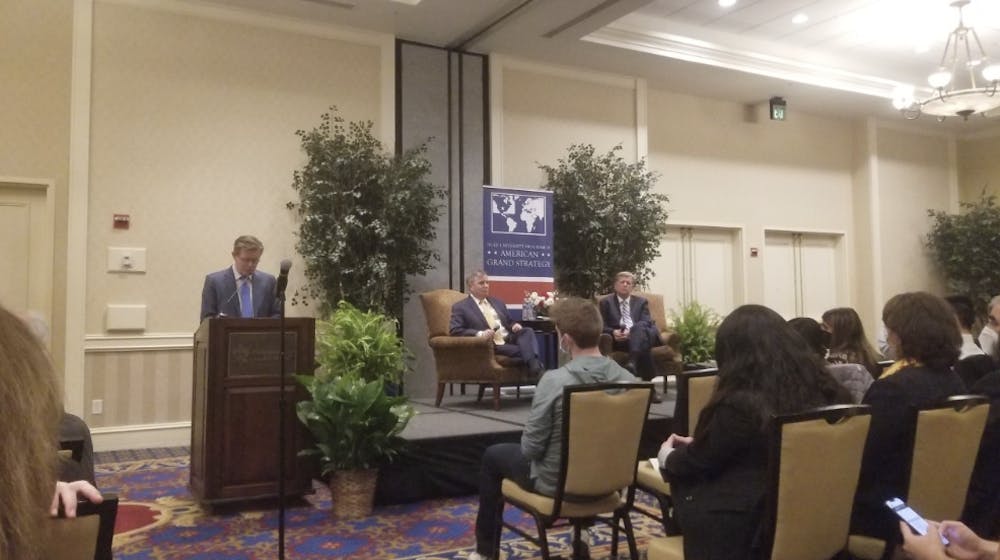The conflict in Ukraine has not gone according to Russia’s plan, the former U.S. ambassador to Russia said at a Tuesday event—but the way it will end is still uncertain.
Peter Feaver, professor of political science and public policy, spoke with Michael McFaul, former U.S. Ambassador to the Russian Federation, on Russia’s invasion of Ukraine in a moderated event Tuesday evening. Topics of discussion included the history of relations between Russia, Ukraine and the West and the potential outcome of the war.
McFaul started the conversation by explaining his personal ties to the conflict. He hosted Ukrainian President Volodymyr Zelenskyy at Stanford last year and personally knew of people who were taking up arms for the first time in their lives to defend Ukraine. He also said that he has known Vladimir Putin for a long time, having met the Russian president for the first time in 1991.
Potential future scenarios
Feaver said that there are three possible scenarios regarding the outcome of the Russia-Ukraine conflict. The first scenario is that Zelenskyy and Ukraine are defeated, the second is that Putin's inner circle invites him to retire, and the third is that there is some exit ramp constructed that would persuade Putin to stop the destruction.
McFaul said that the third scenario is the one the U.S. has most control over, and that he fears the first scenario. However, he argued that a Russian takeover of Ukraine was not sustainable.
“I am 100% convinced that the Ukrainian people will never submit to a puppet regime from Putin, there’s just no way that could happen,” McFaul said. “There will be resistance, there will be violence, there will be guerilla warfare.”
The invasion has not gone to plan
According to McFaul, Russia’s invasion of Ukraine is not going well so far. Ukrainians are
overwhelmed with pride at how Zelenskyy and the Ukrainian military have performed.
“The initial plan of attack that Putin had in place did not work,” McFaul said. “The army was supposed to flee. Zelenskyy was supposed to go to Poland. They were just going to walk into Kiev and put one of their puppets in place, and that didn’t work.”
He then went on to explain that the future was still uncertain, as there is an armored convoy rolling towards Kiev and the Ukrainian military is running out of supplies.
When Feaver asked why the Russians had not anticipated Ukrainian resistance, McFaul said Putin’s lengthy time in power meant that he started to listen less to his advisors. His recent successes in Georgia and Crimea meant that he felt he could not lose to Ukraine.
Given Russian folklore portraying Ukrainians as passive and the information bubble created by Russian propaganda, Putin thought that the invasion of Ukraine would be quick and decisive.
“Russia has all the capabilities on their side. But wars are not just about capabilities,” McFaul said. “Wars are about will. I think [Putin] grossly overestimated the will of his people.”
Pressure on Putin
In response to the Russian invasion of Ukraine, the US and its allies have imposed significant financial sanctions on Russia. This includes limiting Russia’s ability to transact in foreign currencies, freezing the assets of Russian banks and disconnecting certain Russian banks from the SWIFT banking system.
McFaul does not believe Putin is under pressure within his regime so far, but acknowledged that the sanctions put on Russia by the U.S. and European allies are affecting millions of people including, most importantly, Putin’s inner-circle elites.
“Their grandkids are not going to be able to go to Duke anymore. That’s what they’re thinking about,” McFaul said. “They’re not going to be able to go to the French Riviera anymore for their holidays. They’re thinking about how it affects their personal lives … [Putin’s] ruined [their] lives forever.”
The NATO alliance
McFaul is an avid supporter of the NATO military alliance and said that it offers protection for countries like Estonia and Poland.
Feaver asked McFaul what his view was on the NATO critics who say that the expansion of NATO threatened Russia and prompted this invasion. McFaul responded that these critics are ignoring periods of Russia-NATO cooperation over the last 30 years.
“If NATO expansion was such a horrible thing, it should have been a horrible thing all the way through. But that’s not the actual historical record,” McFaul said.
McFaul said that the reason for the Russian invasion isn’t NATO expansion, but rather the expansion of democracy. He said that Putin has constructed a narrative that the Ukrainians and the Russians are the same people and are different from the West, thus if Ukraine implements a successful democracy it threatens his legitimacy.
Looking back
Commenting on the idea that the U.S. should have been tougher in its response to the 2014 Russian annexation of Crimea, McFaul agreed in part. He also noted that the U.S. should have been tougher in 2008 when Russia invaded Georgia, since the Bush administration did not sanction Russia or send lethal assistance.
McFaul also shared his opinions on the actions of the former President Donald Trump’s administration.
“The Trump administration did do some good things on sanctions, on military assistance in particular,” McFaul said. “But I know for a fact the president never supported that. There’s a gap between Trump and his administration.”
He reminded the audience that the first Trump impeachment was related to his withholding of military assistance in Ukraine.
How Duke students can help
Feaver asked McFaul what Duke students and the public in general can do in response to this Russian invasion. He said that one thing people can do is be educated.
“There’s a lot of really horrific myths, so the first thing you should do is educate yourself about the system,” McFaul said.
He then talked about how a group of Ukrainian Stanford students created a website that allowed people to donate money and sign solidarity sheets, and said Duke students can support in such a manner as well.
The event was called “Putin’s Endgame: Russia vs. The West,” and held in the Washington Duke Inn’s Ambassador Ballroom. It was Duke Program in American Grand Strategy’s Spring 2022 Ambassador Dave & Kay Phillips Family International Lecture.
President Vincent Price gave opening remarks condemning Russia’s invasion of Ukraine.
Get The Chronicle straight to your inbox
Signup for our weekly newsletter. Cancel at any time.

Jazper Lu is a Trinity junior and managing editor of The Chronicle's 119th volume.

